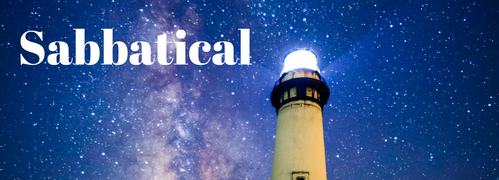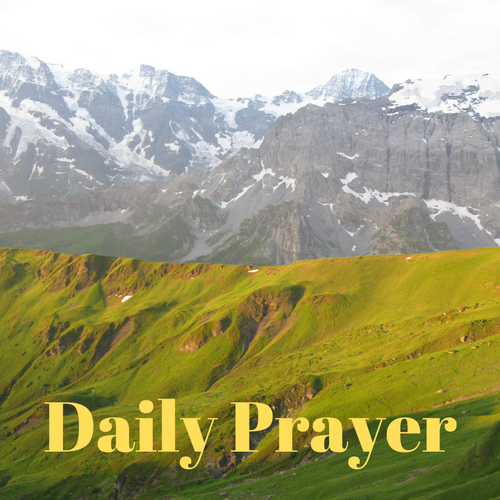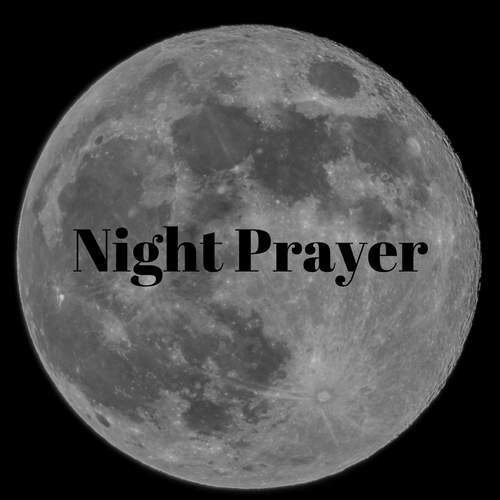

Daily Primer — August 22, Boone - North Carolina
Each day you will be given:
A Florilegium entry
A Daily Prayer
and a Night Prayer.
A Florilegium entry
A Daily Prayer
and a Night Prayer.

The day after the president declared Jerusalem the capital of Israel and set a match to the tinder-box which inevitably will erupt in flames — I am bewildered again.
And to be honest, even if current political decisions were not impacting my prayerful preparation for a pilgrimage to the Holy Land, I find myself unable to move away from wonderment about the idea of “Wilderness” in the life of faith. The Bible is full of stories where people (including Jesus) encounter God in the wilderness. In fact, much of the story of God’s history with God’s people takes place in or at the edge of the wilderness. There is a way in which “wilderness” is unavoidably attached to the actual geographic wildernesses of the Jordan rift valley and the lands claimed by the people of God at the Eastern end of the Mediterranean Sea.
But in the biblical imagination, “wilderness” also is used as a metaphor for all manner of difficulties and experiences of marginalization and peril.
Civilized World <=====> The Wilderness
Mapped <===========> Unmapped and Unknown
Food & Shelter <=====> Food-insecurity & Primitive Shelter
Wordy <=============> Silent
Safe <===============> Perilous
Predictable <========> Surprising
Mastery Through Knowledge <===> The Way of Unknowing
Self-sufficiency <=====> Utter Dependence
Meritocracy <========> Grace-based
Rat-Race <===========> Shabbat-Shalom
The wilderness was the place where all bets were off — where all certainties were seen for the illusion they are.
The wilderness was the place where people are forced to encounter and deal with the limits of their capacity to control things.
A few years ago a monk at Monastery of the Holy Spirit in Conyers, GA was providing me spiritual direction and said, “Paul, your anxiety is a by-product of the illusion you have of control.”
Belden Lane, after a year of watching his mother slowly die, went to the desert and wrote,
“Only at the periphery of our lives, where we and our understanding of God alike are undone, can we understand bewilderment as occasioning another way of knowing.”
I have been wondering about that — bewilderment as occasioning another way of knowing. I haven’t sorted it all out. But I am beginning to see hints of what bewilderment can teach me:
You can love fully without fully understanding:
These past few years as my mother slipped away from me into a demented state I could not understand . . . I was left to work out “What does loving mom look like when I cannot engage in conversation any more, and when my presence sometimes troubles her because she doesn’t know who I am and fears me as a stranger.” And, “How can I best be a fully loving and loyal son without fully understanding the one I love?”
The wilderness forces us to deal with finitude:
I cannot fix everything. I cannot protect the ones I love perfectly from harm and trouble. I cannot even guarantee that I will be alive tomorrow . . . so, as the Psalmist urges us, “We must learn to number our days” and live each one with integrity and meaning. There is no time for pretending to be more or other than we are. We must, in humility, begin again each morning to live as fully as we know that day.
Heaven is not for the smartest person in the room:
Wisdom comes to those who live the foolishness of the cross — which is to choose mercy when anger seems more appropriate; to choose peace when war is called for; to choose kindness when everything in you wants to assert instead that you are right . . . Compassion is the virtue of the wilderness — making grace-filled space for those you encounter, knowing that the only way to survive the desert is to join hands and walk together.
So, I hope that this journey we are on is giving opportunities to experience bewilderment. And if you are there — at the edge of coping — know that you are not alone. You tread your path on the heels of millions of faithful people who have trekked before you — and you walk with the Lord who is with you more than you realize.
And to be honest, even if current political decisions were not impacting my prayerful preparation for a pilgrimage to the Holy Land, I find myself unable to move away from wonderment about the idea of “Wilderness” in the life of faith. The Bible is full of stories where people (including Jesus) encounter God in the wilderness. In fact, much of the story of God’s history with God’s people takes place in or at the edge of the wilderness. There is a way in which “wilderness” is unavoidably attached to the actual geographic wildernesses of the Jordan rift valley and the lands claimed by the people of God at the Eastern end of the Mediterranean Sea.
But in the biblical imagination, “wilderness” also is used as a metaphor for all manner of difficulties and experiences of marginalization and peril.
Civilized World <=====> The Wilderness
Mapped <===========> Unmapped and Unknown
Food & Shelter <=====> Food-insecurity & Primitive Shelter
Wordy <=============> Silent
Safe <===============> Perilous
Predictable <========> Surprising
Mastery Through Knowledge <===> The Way of Unknowing
Self-sufficiency <=====> Utter Dependence
Meritocracy <========> Grace-based
Rat-Race <===========> Shabbat-Shalom
The wilderness was the place where all bets were off — where all certainties were seen for the illusion they are.
The wilderness was the place where people are forced to encounter and deal with the limits of their capacity to control things.
A few years ago a monk at Monastery of the Holy Spirit in Conyers, GA was providing me spiritual direction and said, “Paul, your anxiety is a by-product of the illusion you have of control.”
Belden Lane, after a year of watching his mother slowly die, went to the desert and wrote,
“Only at the periphery of our lives, where we and our understanding of God alike are undone, can we understand bewilderment as occasioning another way of knowing.”
I have been wondering about that — bewilderment as occasioning another way of knowing. I haven’t sorted it all out. But I am beginning to see hints of what bewilderment can teach me:
You can love fully without fully understanding:
These past few years as my mother slipped away from me into a demented state I could not understand . . . I was left to work out “What does loving mom look like when I cannot engage in conversation any more, and when my presence sometimes troubles her because she doesn’t know who I am and fears me as a stranger.” And, “How can I best be a fully loving and loyal son without fully understanding the one I love?”
The wilderness forces us to deal with finitude:
I cannot fix everything. I cannot protect the ones I love perfectly from harm and trouble. I cannot even guarantee that I will be alive tomorrow . . . so, as the Psalmist urges us, “We must learn to number our days” and live each one with integrity and meaning. There is no time for pretending to be more or other than we are. We must, in humility, begin again each morning to live as fully as we know that day.
Heaven is not for the smartest person in the room:
Wisdom comes to those who live the foolishness of the cross — which is to choose mercy when anger seems more appropriate; to choose peace when war is called for; to choose kindness when everything in you wants to assert instead that you are right . . . Compassion is the virtue of the wilderness — making grace-filled space for those you encounter, knowing that the only way to survive the desert is to join hands and walk together.
So, I hope that this journey we are on is giving opportunities to experience bewilderment. And if you are there — at the edge of coping — know that you are not alone. You tread your path on the heels of millions of faithful people who have trekked before you — and you walk with the Lord who is with you more than you realize.
From a blog-post I made on December 7, 2017 — PHL.
Belden Lane Quote - from The Solace of Fierce Landscapes by Belden Lane.
Belden Lane Quote - from The Solace of Fierce Landscapes by Belden Lane.
Florilegium is the Medieval Latin word for bouquet, or more literally flowers (flos, flor-) which are gathered (legere). The word florilegium was used to refer to a compilation of writings, often religious or philosophical. These florilegium are literary flowers—beautiful words/prayers/thoughts I have gathered. During my sabbatical they will give me something to ponder each day. — PHL.

In-Between
We find ourselves always between
obedience to you about which we are serious and coveting to advance our own interests.
You command generosity,
and we grasp in greediness.
But sometimes your commands come through to us
as harshness and abusiveness.
We hear you in and through our own
sense of right
and we obey you in ruthless ways,
taking ourselves always to be the "good guys."
But sometimes we break from such harsh demand
that we have inhaled too long,
and we find ourselves gentle and forgiving,
and worried about going soft
on those whom you judge.
We pray then that you would be your true self
more clearly
and less harshly
that we may be our true selves,
even if we must unlearn
something of you.
Because your commands are sturdy and
because we are tempted to live apart from you,
we are too often conflicted.
We do not pray to be eased from our dis-ease,
but only for courage and freedom
to relearn you and
to reimagine ourselves.
You and us dreamed at our best ...
that we may be "all that we can be."
We find ourselves always between
obedience to you about which we are serious and coveting to advance our own interests.
You command generosity,
and we grasp in greediness.
But sometimes your commands come through to us
as harshness and abusiveness.
We hear you in and through our own
sense of right
and we obey you in ruthless ways,
taking ourselves always to be the "good guys."
But sometimes we break from such harsh demand
that we have inhaled too long,
and we find ourselves gentle and forgiving,
and worried about going soft
on those whom you judge.
We pray then that you would be your true self
more clearly
and less harshly
that we may be our true selves,
even if we must unlearn
something of you.
Because your commands are sturdy and
because we are tempted to live apart from you,
we are too often conflicted.
We do not pray to be eased from our dis-ease,
but only for courage and freedom
to relearn you and
to reimagine ourselves.
You and us dreamed at our best ...
that we may be "all that we can be."
prayer of Walter Brueggemann after reading 1 Samuel 15. Published in Prayers for Privileged People, pp. 119-120.

The night of defeat is long and still and unbearable.
We know the nights.
And our sisters and brothers
who are cold,
and hungry,
and brutalized know them better than we do.
And you also know the night in Ashdod and on a trillion other times.
How it is with you in the night we do not know.
Perhaps it is like it is with us.
We, with the Philistines, are stunned by the morning.
Stunned to find our pet projects toppled.
Stunned to find our favorite gods failed.
Stunned to find our managed hopes defeated.
Then you in the morning.
You only.
You in splendor.
You in glory.
You in power.
This day we dazzle at your glory in the midst of our long night.
Move in your glory this day in the midst of our many nights.
Bring us to you to your day.
To your new day.
Your third day. Amen.
We know the nights.
And our sisters and brothers
who are cold,
and hungry,
and brutalized know them better than we do.
And you also know the night in Ashdod and on a trillion other times.
How it is with you in the night we do not know.
Perhaps it is like it is with us.
We, with the Philistines, are stunned by the morning.
Stunned to find our pet projects toppled.
Stunned to find our favorite gods failed.
Stunned to find our managed hopes defeated.
Then you in the morning.
You only.
You in splendor.
You in glory.
You in power.
This day we dazzle at your glory in the midst of our long night.
Move in your glory this day in the midst of our many nights.
Bring us to you to your day.
To your new day.
Your third day. Amen.
A prayer of Walter Brueggemann entitled Stunned by the Morning, offered in class as we studied 1 Samuel 5, March 2, 2000.
